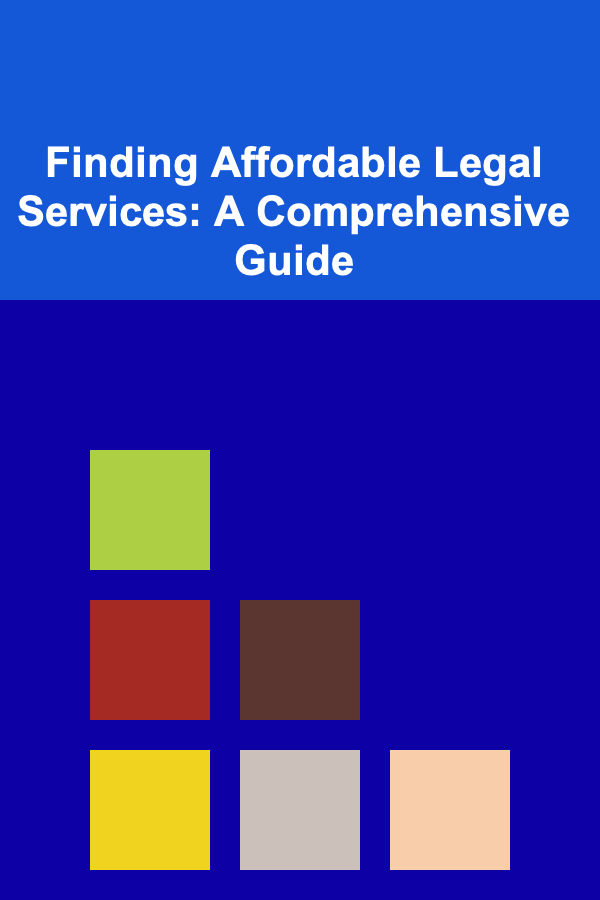
Finding Affordable Legal Services: A Comprehensive Guide
ebook include PDF & Audio bundle (Micro Guide)
$12.99$5.99
Limited Time Offer! Order within the next:

Navigating the legal system can be daunting, especially when facing financial constraints. Access to justice shouldn't be limited by income. This comprehensive guide aims to provide practical strategies and resources for individuals and organizations seeking affordable legal services. It covers a range of options, from leveraging pro bono assistance to understanding alternative fee arrangements, empowering you to make informed decisions about your legal representation.
Understanding the Landscape of Legal Costs
Before exploring affordable options, it's crucial to understand what drives legal costs. Several factors contribute to the overall expense of legal representation:
- Attorney's Hourly Rate: This is a primary driver of cost. Rates vary significantly based on experience, specialization, location, and firm size. Attorneys in major metropolitan areas generally charge higher hourly rates than those in smaller towns. Highly specialized attorneys with decades of experience in complex areas of law will command premium rates.
- Case Complexity: The more complex a case, the more time and resources it will require. A simple contract dispute will likely be less expensive than a multi-party lawsuit involving intricate legal arguments and extensive discovery.
- Discovery Costs: Discovery, the process of gathering evidence, can be a major expense. This includes costs associated with depositions (oral examinations under oath), document production, interrogatories (written questions), and expert witness fees. Electronic discovery (eDiscovery) can be particularly costly.
- Court Filing Fees: Filing fees vary by jurisdiction and type of case. These are typically non-negotiable and can add up, especially in lengthy litigation.
- Research and Investigation: Thorough legal research and factual investigation are essential for a successful case. This involves time spent by attorneys and paralegals researching legal precedents, interviewing witnesses, and gathering evidence.
- Travel Expenses: If your attorney needs to travel for depositions, hearings, or court appearances, you will likely be responsible for covering their travel expenses, including airfare, lodging, and meals.
- Administrative Costs: These costs can include photocopying, postage, phone calls, and other administrative tasks necessary to manage the case.
Understanding these cost drivers allows you to ask informed questions when discussing fees with potential attorneys. Don't hesitate to inquire about ways to potentially reduce costs, such as limiting discovery or delegating tasks to paralegals.
Exploring Pro Bono and Legal Aid Options
Pro bono and legal aid organizations offer free or significantly reduced-cost legal services to individuals who meet specific income eligibility requirements. These are often the first and most accessible resources for low-income individuals seeking legal assistance.
Pro Bono Services
Pro bono, derived from the Latin phrase "pro bono publico" (for the public good), refers to legal services provided voluntarily and without charge or at a significantly reduced fee. Many attorneys are committed to providing pro bono services as part of their professional responsibility. Here's how to find pro bono assistance:
- Local Bar Associations: Most state and local bar associations have pro bono programs. These programs often match eligible individuals with attorneys willing to provide free legal assistance. Check the website of your local bar association or contact them directly to inquire about pro bono services. Many have online referral services that can connect you with suitable attorneys.
- Legal Aid Organizations: While Legal Aid typically refers to organizations specifically designed for low-income individuals, some also administer pro bono programs.
- Law School Clinics: Law schools often operate clinics that provide free legal services to the community. These clinics are staffed by law students under the supervision of experienced professors. Areas of focus may include family law, immigration law, consumer law, and landlord-tenant law.
- National Pro Bono Organizations: Several national organizations focus on pro bono work in specific areas of law, such as immigration (e.g., American Immigration Lawyers Association) or civil rights (e.g., ACLU).
- Court-Annexed Programs: Some courts offer pro bono programs or self-help centers where individuals can receive assistance with legal forms and procedures.
When seeking pro bono assistance, be prepared to provide documentation of your income and assets to demonstrate your eligibility. Understand that pro bono resources are often limited, and there may be a waiting list for services.
Legal Aid Societies
Legal aid societies are non-profit organizations that provide free or low-cost legal services to low-income individuals and families. They are often funded by government grants, private donations, and foundation support.
- Finding Legal Aid: The Legal Services Corporation (LSC) is the largest funder of legal aid programs in the United States. You can find LSC-funded legal aid programs in your area by visiting the LSC website (www.lsc.gov) or searching online for "legal aid [your city/state]".
- Eligibility Requirements: Legal aid programs typically have strict income eligibility requirements. These requirements vary by program and location but are generally based on the federal poverty guidelines. You will likely need to provide documentation of your income, assets, and household size.
- Areas of Focus: Legal aid programs typically focus on areas of law that disproportionately affect low-income individuals, such as family law, housing law, public benefits, and consumer law.
- Limitations: Legal aid programs often have limited resources and may not be able to represent everyone who applies for assistance. They may also have limitations on the types of cases they can handle.
If you are eligible for legal aid, be prepared to cooperate fully with the organization and provide all necessary information promptly. Remember that legal aid attorneys are often handling a large caseload, so be patient and understanding.
Exploring Alternative Fee Arrangements
Traditional hourly billing can be unpredictable and expensive. Alternative fee arrangements offer more predictable and potentially cost-effective options for paying for legal services.
Flat Fees
A flat fee is a fixed price for a specific legal service, such as drafting a will, handling an uncontested divorce, or representing a client in a simple traffic violation case. This arrangement provides cost certainty and allows you to budget more effectively.
- Benefits: Predictable costs, no surprises, easier budgeting.
- Considerations: Flat fees are typically only available for relatively straightforward matters. The attorney may increase the fee if the scope of the work expands significantly. Ensure you understand exactly what is included in the flat fee and what additional costs you may be responsible for.
- Negotiating Flat Fees: Don't be afraid to ask an attorney if they offer flat fees for your type of case. If they do, ask for a detailed description of the services included in the fee.
Contingency Fees
A contingency fee arrangement means the attorney only gets paid if they win your case. Their fee is a percentage of the settlement or judgment you receive. This arrangement is common in personal injury cases and other types of litigation where a monetary recovery is sought.
- Benefits: No upfront costs, the attorney is incentivized to win your case, reduces the financial risk for the client.
- Considerations: Contingency fees are typically higher than hourly rates. You may still be responsible for paying court costs and other expenses, even if you lose the case. Contingency fees are not permitted in all types of cases, such as criminal defense or divorce (in most jurisdictions).
- Percentage: The percentage the attorney takes can vary, but it is important to negotiate this at the outset of the case.
Limited Scope Representation (Unbundled Legal Services)
Limited scope representation, also known as unbundled legal services, allows you to hire an attorney to handle specific tasks in your case, such as drafting legal documents, providing legal advice, or representing you at a single hearing. This can be a more affordable option than hiring an attorney for full representation.
- Benefits: Reduces overall legal costs, allows you to handle some aspects of the case yourself, provides access to expert legal advice for specific tasks.
- Considerations: You are responsible for handling the rest of your case yourself. You need to be comfortable representing yourself in court and understanding legal procedures. Finding an attorney willing to provide limited scope representation can sometimes be challenging.
- Finding Attorneys: Search online for attorneys who offer "unbundled legal services" or "limited scope representation" in your area. Your local bar association may also have a referral service that can connect you with attorneys who offer these services.
Hybrid Fee Arrangements
Hybrid fee arrangements combine elements of different fee structures. For example, you might agree to pay a reduced hourly rate plus a contingency fee, or a flat fee for certain tasks and an hourly rate for others. This allows for flexibility and can be tailored to your specific needs and budget.
Negotiating with Attorneys
Negotiating with attorneys about fees is essential for finding affordable legal services. Don't be afraid to discuss your budget constraints and explore alternative fee arrangements. Here are some tips for negotiating with attorneys:
- Be Upfront About Your Budget: Let the attorney know upfront what you can afford to pay. This will help them tailor their services to your budget and explore alternative fee arrangements.
- Ask About Payment Plans: Many attorneys offer payment plans to help clients manage their legal fees. Ask if they are willing to set up a payment plan that works for you.
- Inquire About Discounts: Some attorneys offer discounts to seniors, students, or members of the military. Don't hesitate to ask if they offer any discounts that apply to you.
- Compare Fees from Multiple Attorneys: It's always a good idea to consult with multiple attorneys before making a decision. Compare their fees and services to find the best value.
- Get Everything in Writing: Once you have agreed on a fee arrangement, make sure it is put in writing in a written fee agreement. This will protect you from misunderstandings and disputes later on. The fee agreement should clearly outline the scope of work, the fee structure, how expenses will be handled, and the method of payment.
Utilizing Online Resources and Technology
The internet offers a wealth of resources that can help you find affordable legal services and navigate the legal system. Online legal directories, self-help websites, and legal document services can provide valuable assistance.
Online Legal Directories
Online legal directories, such as Avvo, Martindale-Hubbell, and FindLaw, can help you find attorneys in your area who specialize in your type of case. These directories often include attorney profiles, client reviews, and fee information.
- Benefits: Easy access to information about attorneys, ability to compare attorneys based on experience and fees, client reviews provide valuable insights.
- Considerations: Not all attorneys are listed in these directories. Client reviews can be subjective and may not always be accurate. Verify the attorney's credentials and disciplinary history before hiring them.
Self-Help Websites and Resources
Many websites offer free legal information and resources, such as legal guides, articles, and forms. These resources can help you understand your legal rights and options and potentially handle some aspects of your case yourself.
- Examples: Nolo, LegalZoom, and state court websites.
- Benefits: Free access to legal information, ability to learn about your legal rights and options, potential to save money by handling some aspects of the case yourself.
- Considerations: Online legal information is not a substitute for legal advice from a qualified attorney. Be careful when using online legal forms, as they may not be suitable for your specific situation. Always seek professional legal advice before making any important legal decisions.
Legal Document Services
Legal document services, such as LegalZoom and Rocket Lawyer, offer pre-drafted legal documents and forms that you can customize to your specific needs. These services can be a more affordable option than hiring an attorney to draft documents from scratch.
- Benefits: Lower cost than hiring an attorney, convenient and easy to use, access to a wide range of legal documents.
- Considerations: Legal document services do not provide legal advice. The documents may not be suitable for your specific situation. It's important to understand the legal implications of the documents before using them.
Other Strategies for Reducing Legal Costs
Beyond the options discussed above, there are other strategies you can employ to reduce your legal costs.
Mediation and Arbitration
Mediation and arbitration are alternative dispute resolution (ADR) methods that can be less expensive and time-consuming than litigation. Mediation involves a neutral third party who helps the parties reach a settlement agreement. Arbitration involves a neutral third party who makes a binding decision in the case.
- Benefits: Lower costs, faster resolution, more flexible process, less adversarial.
- Considerations: Mediation is not always successful. Arbitration is binding, so you may not be able to appeal the arbitrator's decision.
Thorough Preparation
Being well-prepared for meetings with your attorney can save time and money. Gather all relevant documents, organize your thoughts, and write down your questions in advance. The more organized you are, the more efficient your attorney can be.
Clear Communication
Communicate clearly and effectively with your attorney. Respond promptly to their requests for information and ask questions if you don't understand something. The better you communicate, the less time your attorney will spend clarifying issues and gathering information.
Careful Document Review
Review all documents carefully before signing them. If you don't understand something, ask your attorney to explain it to you. This can prevent misunderstandings and potential legal problems down the road.
Choosing the Right Attorney
Selecting the right attorney for your case is crucial for both the outcome of your case and managing costs. Don't simply choose the cheapest option; consider experience, specialization, and communication style.
- Experience: Does the attorney have significant experience in the relevant area of law?
- Specialization: Is the attorney a specialist in the type of case you have? A specialist will likely be more efficient and effective.
- Communication Style: Are you comfortable communicating with the attorney? Do they explain things clearly and patiently?
- References: Ask for references from past clients.
Understanding the Legal Profession's Ethical Obligations
It's important to remember that attorneys are bound by ethical rules that require them to act in their clients' best interests. These obligations can provide some protection against overbilling or unethical practices.
- Duty of Confidentiality: Attorneys must keep client information confidential.
- Duty of Loyalty: Attorneys must act in their clients' best interests and avoid conflicts of interest.
- Reasonable Fees: Attorneys are required to charge reasonable fees. If you believe you have been overbilled, you can file a complaint with your state's bar association.
Conclusion: Empowering Yourself to Find Affordable Legal Help
Finding affordable legal services requires proactive research, careful planning, and effective communication. By understanding the factors that drive legal costs, exploring alternative fee arrangements, and utilizing available resources, you can navigate the legal system without breaking the bank. Don't be afraid to ask questions, negotiate fees, and explore all available options. Remember, access to justice is a fundamental right, and there are resources available to help you find affordable legal representation, regardless of your financial situation. Empowering yourself with knowledge and taking proactive steps is the key to securing the legal help you need.

How to Create a Modern Look in Your Old Home
Read More
Mastering Security Guard Duties: Advanced Strategies for Enhancing Protection and Preventing Threats
Read More
How To Reduce Your Risk of Type 2 Diabetes
Read More
Raising Resilient Kids: Tools for Navigating Life's Ups and Downs
Read More
Investing in Biotech Stocks: A Comprehensive Guide
Read More
10 To-Do List Mistakes Entrepreneurs Make (and How to Avoid Them)
Read MoreOther Products

How to Create a Modern Look in Your Old Home
Read More
Mastering Security Guard Duties: Advanced Strategies for Enhancing Protection and Preventing Threats
Read More
How To Reduce Your Risk of Type 2 Diabetes
Read More
Raising Resilient Kids: Tools for Navigating Life's Ups and Downs
Read More
Investing in Biotech Stocks: A Comprehensive Guide
Read More